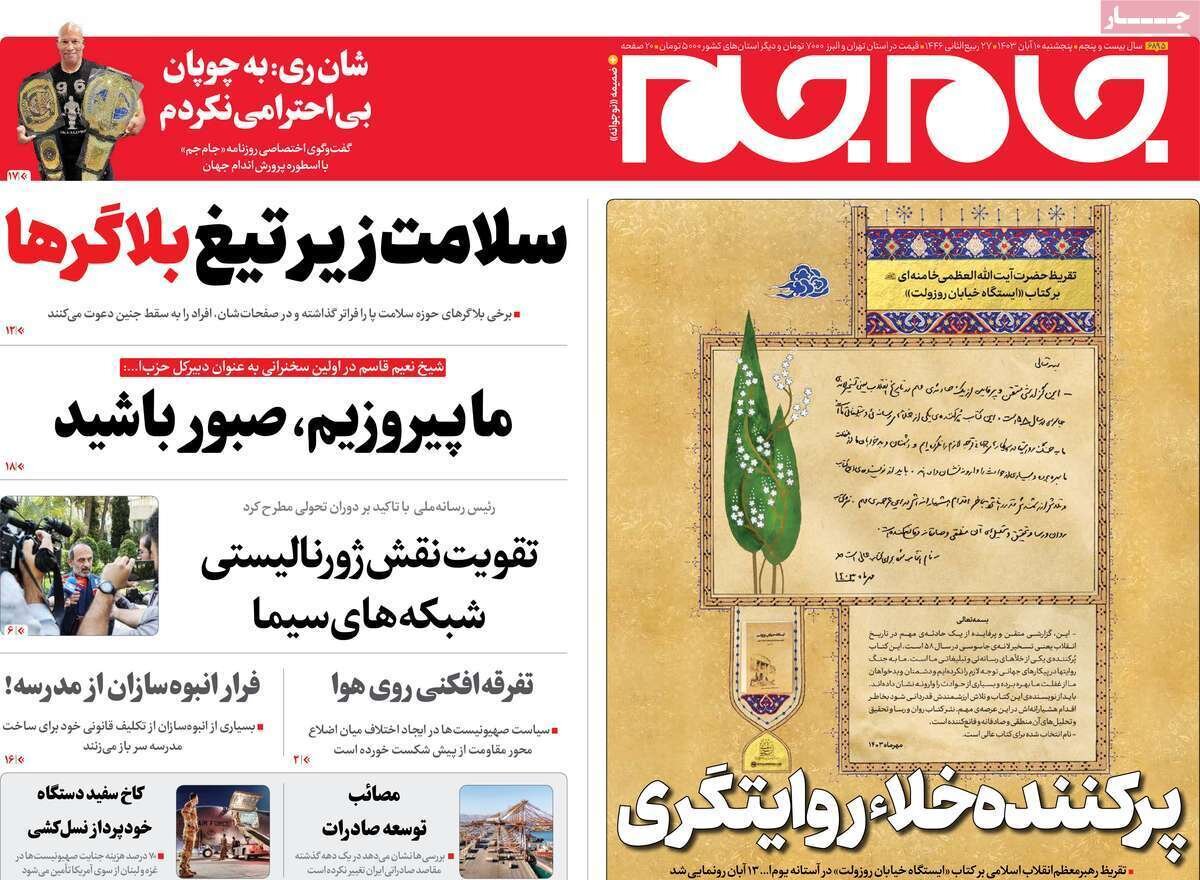TEHRAN PAPERS

TEHRAN - In a note, Jam-e-Jam addressed America's role in the Middle East and wrote: America's role in the ongoing developments in the region is completely obvious to everyone.
On one hand, it uses all facilities to support the Zionist regime, and on the other, it sends a message that it wants to reduce tension in the region, especially with the Islamic Republic of Iran. Therefore, according to the experiences we have gained in confronting America for many years, including the JCPOA, as well as their lies regarding the Gaza crisis, we should be well aware of their deception. America's approach is that whenever the Zionist regime commits criminal actions in the region, it supports this regime and calls its crimes “defense”, but if Iran, Hezbollah, and Hamas respond to these aggressions, American officials accuse them of making the region insecure. It is in such a situation that allies of NATO and Western countries start to send various messages calling on the Islamic Republic to exercise self-restraint and in return, they do not show any reaction to the crimes of the Zionist regime. The Islamic Republic should in no way provide this opportunity for the United States to succeed in suppressing the axis of resistance through Israel.
Javan: Iran's strength is its ability to deter
In an analysis, Javan dealt with Iran's strength in confronting the enemy. It wrote: Israel's attack on Iran cannot be hidden as a major attack, but now even the Zionists themselves refuse to publicize it. According to the Israeli war minister, the attack was aimed to completely destroy Iran's air defense systems and radars and open the country's skies for future attacks. It should be said that Iran's power is not just limited to its air defense power so that if it is destroyed, America and Israel can carry out attacks with a free hand. In addition to its self-defense power, Iran has also proven its offensive power. But there are also four types of deterrence. First, the political deterrence, which is now at its peak with internal unity. Second, the economic deterrence that Iran has shown its tolerance for despite enduring the most severe sanctions for several decades. The third is military deterrence, which the world is now waiting for Iran's "power of will, initiative and unknown abilities". And lastly, nuclear deterrence, which we classify as separate from military dimensions but we know that the enemy's imagination is not free with this deterrence of Iran.
Donya-e-Eqtesad: Tehran is the most important competitor for Riyadh
In a commentary, Donya-e-Eqtesad addressed Riyadh's concern about Iran's power and said: The Saudi Crown Prince is looking for military superiority over his regional neighbors. Saudi Arabia has nuclear ambitions as it seeks to launch a civilian nuclear program similar to Iran through an agreement with the United States. Bin Salman has openly argued that if Iran moves towards building nuclear weapons, Saudi Arabia will follow suit. Riyadh has always seen Tehran as its regional rival. It was Bin Salman who took an overtly aggressive and confrontational stance against Iran. Riyadh still sees Tehran as the most important threat to its security and regional ambitions. Harris's message that she is willing to resume talks with Tehran and rejoin the nuclear deal (if she is elected president) may create a strategic dilemma for Riyadh. It may also raise fears among the Persian Gulf (Arab) countries of Iran's regional dominance.
Iran: BRICS will make Iran-China relations stronger
The Iran newspaper said BRICS will help strengthen relations between Iran and China. It said: Given its position and economic capacity, BRICS will change the face of the world in the future. We are moving away from an economic superpower in the world as regional powers and international blocs are emerging. Recently, at the BRICS summit, the Chinese President clearly told Mr. Pezeshkian that whatever happens in the world it will not hinder the friendship and cooperation between Iran and China. The recent events and political tensions that have occurred between Iran and the Israeli occupation regime will not disrupt trade relations and cooperation between Iran and China. China plans to expand its level of cooperation with Iran. Therefore, this issue has two meanings; despite tension in the Middle East and a possible victory of Trump in the U.S. presidential election, the relations between Iran and China will become stronger and we will not witness any disruption. Accordingly, China will continue to be a buyer of Iranian oil in the future. Currently, we sell more than one and a half million barrels of oil, a significant amount of which is sold to the Chinese.

No comments:
Post a Comment